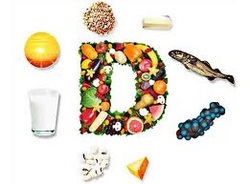
Source: Vitamin D Deficiency and Supplementation and Relation to Cardiovascular Health
 Chronic vitamin D deficiency has been associated with an increased risk of developing numerous chronic diseases and/or all-cause death - especially from cardiovascular and diabetes. Individuals in this vulnerable population who began taking the sunshine vitamin experienced a significant increase in overall survival. Source: Vitamin D Deficiency and Supplementation and Relation to Cardiovascular Health
2 Comments
Scientists from the National Institutes of Health (NIH) have found clues to why our bad habits are so difficult to kick. Not only that, they're working on developing strategies to help us change.
Habits in general play an important role in our health. By understanding the biolodgy of harmful routines and how to break our bad habits and adopt new ones, this may help us embrace healthier lifestyle behaviors. Habits, whether it's brushing your teeth or eating sweets, develop over time through repetition. Habits are a normal developmental process in our lives that can either be helpful or detrimental. If you really think about it, we all shower, comb our hair or brush our teeth without being aware of it, which frees our brains to focus on different things. Habits can also develop by triggering the brain's "reward" centers, setting up potentially harmful routines such as overeating, smoking, drug or alcohol abuse, gambling and even compulsive use of computers and social media. Enjoyable behaviors actually release a brain chemical called dompamine, which strengthens our habits - whether good or bad - even more. This explains why some people crave sweets, even if they no longer feel particularly good after they eat them. It's not a hopeless cause, however. The good news is that humans are not simply creatures of habit. Humans demonstartate much better control at changing and orienting behavior toward long-term goals or benefits compared to any other animal. It has actually been found that you can improve your self-control by doing exercises over time. While there's no single effective way to break bad habits, one approach is to become more aware of unhealthy habits, then develop strategies to counteract them. For example, avoid walking halls where there's a candy machine; avoid places where you've usually smoked; stay away from friends and situations linked to problem drinking or drug use. Another helpful technique is to mentally practice the good behavior over the bad. Mindful eating, for example, is a great place to start when it comes to working on improving your eating habits. It's not guaranteed to work, but it certainly can help. Some people find they can replace a bad habit, even drug addiction, with another behavior, like exercising. It won't always work for everyone, but most individuals can, over time, engage in ritualistic behaviors - such as running - and it can help them stya away from boredom eating, smoking or drug use. Understand, however, that replacing a first-learned habit doesn't erase the original behavior. What you can do is strengthen the new one and suppress the original. Current research is done by the NIH is exploring whether certain medications can help to disrupt hard-wired behaviors and make it easier to form new ones. Researchers are also are seeking genes that might allow people to easily form or readily suppress habits. Bad habits may be challenging to change, but it can be done - especially when you put your mind to it. Make sure you take time to set goals for yourself and review them daily. You'll be amazed at how this simple step can help you when your motivation is waning. Enlist the help of friends, co-workers and family to help keep you motivated and on the right track when it comes to achieving your goals. You can do it! Break Bad Habits
|
AuthorAlissa Robertson, MS, RD, Nutrition Specialist and Owner of Lifestyle Management & Nutrition, received her Bachelor's Degree in Dietetics and Nutrition from the University of Vermont. Upon graduation in 2003 she spent four years providing nutrition education and counseling to local Vermonters. In 2007 she returned to the University of Vermont to complete a two-year Master's program in Dietetics and Nutrition. She is now practicing as a Registered Dietitian at Essex Physical Therapy located in Essex Center, Vermont. Archives
November 2013
Categories
All
|